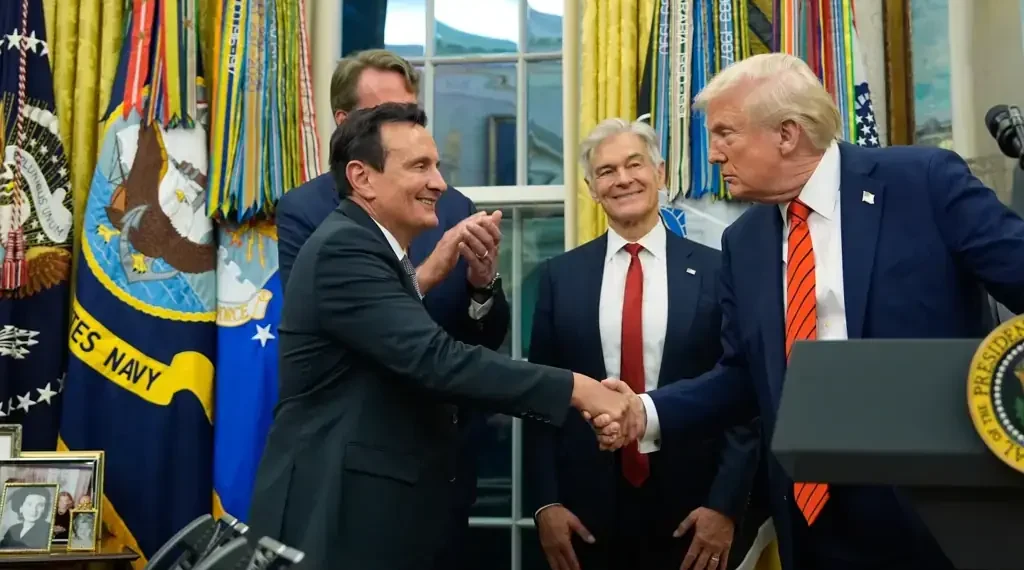AstraZeneca Agrees to Price Reductions Under U.S. Drug Pricing Plan
Published: October 13, 2025, 22:10 EDT
AstraZeneca has reached an agreement with the Trump administration to lower prescription drug prices for Medicaid, marking a significant move in the administration’s ongoing effort to make medicines more affordable. The deal, announced Friday at the White House, also spares the British drugmaker from potential tariffs threatened by President Donald Trump.
White House Announces Agreement With AstraZeneca
President Trump, alongside AstraZeneca Chief Executive Pascal Soriot, unveiled the agreement in the Oval Office. The arrangement will allow Medicaid to receive “most-favored-nation” pricing—ensuring that the U.S. government pays no more than the lowest price offered in comparable developed nations.
“For many years, Americans have paid the highest prices in the world for prescription drugs, by far,” Trump said during the announcement. “This deal will cut prices to the lowest level anywhere in the world—that’s what we get.”
Soriot described the negotiations as “tough but productive,” noting that the administration’s persistence pushed the company toward a comprehensive solution.
Part of Broader Push to Lower Prescription Costs
The AstraZeneca deal follows a similar agreement made by Pfizer last month, both stemming from a May executive order requiring drugmakers to reduce prices voluntarily or face federal payment restrictions. The policy has been described by the administration as an incentive-based approach to reforming pharmaceutical pricing.
Trump said tariffs played a key role in bringing companies to the table. “The tariffs were a big reason he came here,” he said, referring to Soriot.
Policy experts and consumer advocates have cautiously welcomed the development but warned that structural safeguards are needed to ensure long-term affordability rather than temporary reductions driven by executive action.
AstraZeneca’s Expanding U.S. Presence
Headquartered in Cambridge, United Kingdom, AstraZeneca is known for its portfolio of cancer treatments, including Tagrisso (lung cancer), Lynparza (ovarian cancer), and Calquence (chronic lymphocytic leukemia). Together, those drugs generated over $7.5 billion in U.S. sales last year, according to company data.
As part of its long-term U.S. investment strategy, AstraZeneca announced a $4.5 billion manufacturing facility near Charlottesville, Virginia. Virginia Governor Glenn Youngkin joined the Oval Office event to celebrate the project, which is expected to generate 3,600 new jobs in its initial phase.
The company said the Virginia plant is central to its $50 billion investment plan in the United States through 2030. AstraZeneca aims to reach $80 billion in annual revenue by that time, with roughly half coming from the U.S. market.
Political and Industry Reactions
President Trump credited his administration’s policies for encouraging major drugmakers to agree to voluntary cost reductions. He also criticized Democrats for attempting to claim political credit for similar pricing reforms initiated during the Biden administration.
One of AstraZeneca’s cancer drugs had already seen a price adjustment under Medicare negotiations launched during President Biden’s term. Despite that, Trump insisted the new agreement reflects his administration’s distinct approach to direct negotiation with pharmaceutical companies.
Economic analysts have noted that AstraZeneca’s decision to cancel an earlier vaccine facility expansion in the U.K. may have influenced its pivot toward deeper U.S. investments, citing favorable tax and regulatory conditions under the current administration.
Launch of TrumpRX.gov for Direct Drug Purchases
The White House also previewed a new online platform, TrumpRX.gov, designed to allow Americans to purchase medications directly from manufacturers. The website, set to launch in January 2026, will initially feature drugs from Pfizer and AstraZeneca.
According to officials, the portal aims to streamline pharmaceutical distribution by reducing intermediaries and ensuring lower retail prices for consumers.
The TrumpRX.gov landing page currently displays large photos of President Trump and a “Coming Soon” banner, along with a note stating it was “Designed in DC by The National Design Studio,” a government web design hub created in August and led by Airbnb co-founder Joe Gebbia.
Analysts Say Broader Implications Still Unclear
Economists and public health experts say the AstraZeneca deal represents progress toward lowering drug costs, but its long-term impact will depend on enforcement and continued cooperation between the federal government and pharmaceutical firms.
“If these price guarantees are maintained beyond the current administration, it could mark a turning point in U.S. healthcare affordability,” said Sarah Bloom, a senior analyst at the Brookings Institution. “But sustained oversight will be critical to prevent prices from rebounding once political pressure subsides.”
This article was rewritten by JournosNews.com based on verified reporting from trusted sources. The content has been independently reviewed, fact-checked, and edited for accuracy, neutrality, tone, and global readability in accordance with Google News and AdSense standards.
All opinions, quotes, or statements from contributors, experts, or sourced organizations do not necessarily reflect the views of JournosNews.com. JournosNews.com maintains full editorial independence from any external funders, sponsors, or organizations.
Stay informed with JournosNews.com — your trusted source for verified global reporting and in-depth analysis. Follow us on Google News, BlueSky, and X for real-time updates.














